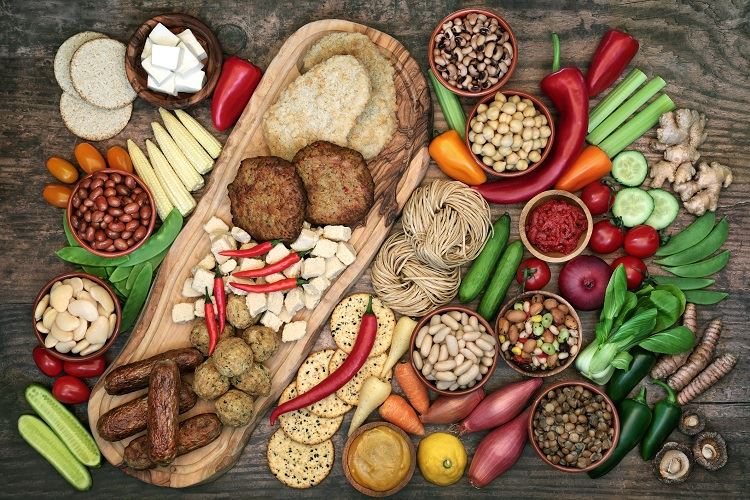Isn’t eating great? On the one hand, you eat some food, you digest it and you have energy. If you overeat you put on weight, if some food gives you pleasure, some food you don’t digest well. On one hand, it is simple, and on the other hand, the sheer level of complicatedness of human digestion is fascinating.
Consumption and digestion of food and supplements, as well as metabolism, are extremely important for our health

Looking after your diet and nutrition is not straightforward. It is not just what you eat and how much you eat. The human diet is an overwhelmingly complex and confusing subject and we do not yet still have a complete picture. We know enough to see what is good for us and what is bad for us generally.
There may not be a best diet for a human
- There is good evidence that there is no such thing as a perfect human diet.
- There is also good evidence that there are certain things you should avoid in your diet.
- There is evidence that some things you should include in your diet.
- There is also evidence that some parts of what diet will work best for you will not work for others. So an ideal diet should be tailored to the individual.
- There is also evidence that our body’s digestive system adapts to different foods and is evolving.
Taking all of this into account, providing a definitive answer for everyone is impossible. The best way to approach the question is to approach it differently, looking at an individual instead of humanity as a whole:
Best diet for you as an individual
There are many signs that the digestive system is not responding well to food and most of us can recognize them. For some these problems are chronic and barely noticeable, for others, it is something unrecognizable. Sometimes, digestion problems can indicate further health issues somewhere else so they should not be ignored.
Components of diet and nutrition: quality, quantity, timing and psychology
To understand the difference between a good and bad diet, it’s essential to consider three key components that contribute to ideal homeostasis—meaning the body’s perfect function by meeting everyday needs: quality, quantity, and time-related factors. In addition, there is the psychology of diet and nutrition which is more about us.
Psychology of diet
Knowing the science of nutrition is not enough, there are also cravings and impulses, and knowledge alone does not guarantee action – we need to address the psychology of nutrition in terms of cravings and impulses as well as hunger, and satiety, understanding all of this leads us to formulate the applicable mindset to enjoy meals.
From the perspective of science, we are aware of the challenges we face in organizing and planning our diet and controlling our impulses. Besides offering science, we’re also looking at how our bodies trick us and how food impacts our decision-making and mental health.
However, it is a two-way street, there are ways to trick our bodies too.
A lot about diet touches upon psychology – why do we give up healthy foods, cheat, stop our diet, or pick out the wrong things to eat and drink?
There is addiction, there is a conflict between what you want and what you know is bad for you. Understanding what is good and bad for you is one thing, acting upon it is another.
Quality of nutrition

You are what you eat!
Quality of diet refers specifically to the nutritional content and bioavailability of foods consumed. It emphasizes the importance of nutrient-dense foods that provide essential vitamins, minerals, and other beneficial compounds in forms that the body can readily absorb and utilize. High-quality nutrition ensures that all the body’s homeostasis needs are met, supporting overall health and optimal bodily function.
- Calorie and Nutrient Quality: This refers to the content and bioavailability of calories and nutrients in response to the body’s needs. A good diet provides a balanced mix of macronutrients (proteins, fats, and carbohydrates) and micronutrients (vitamins and minerals) from diverse and natural sources. Bioavailability is crucial as it determines how well nutrients are absorbed and utilized by the body.
- Response to Needs: Foods rich in essential nutrients, such as whole grains, lean proteins, healthy fats, and a variety of fruits and vegetables, help maintain energy levels and support bodily functions. Conversely, a bad diet often includes high amounts of processed foods, sugars, and unhealthy fats, leading to nutrient deficiencies and poor health outcomes.
Quantity of consumed foods

You are how much you eat!
The quantity of consumed food significantly impacts body and cell homeostasis, as both excessive and insufficient intake can disrupt the balance required for optimal function. Consuming a moderate quantity of food supports hormesis-related processes, where mild stress from limited nutrient intake can enhance cellular repair mechanisms, resilience, and overall health.
- Caloric Intake: The amount of calories consumed should align with an individual’s energy needs based on factors like age, gender, weight, and activity level. Overconsumption or underconsumption of calories can lead to weight gain, malnutrition, or other health issues.
- Nutrient Intake: Adequate intake of essential nutrients is necessary for maintaining health. Consuming the right quantities of vitamins, minerals, and other nutrients ensures the body functions optimally. A bad diet may involve either insufficient or excessive intake of these nutrients, both of which can disrupt homeostasis.
Time-Related Factors

You are when you eat and when you don’t eat!
The timing of food consumption plays a crucial role in maintaining body homeostasis. Factors such as intervals between meals, fasting practices, and the time of day when eating occurs all influence metabolic health, energy levels, and overall well-being.
- Meal Timing: The timing of meals can significantly impact metabolism and energy levels. Regular meal patterns, such as eating breakfast, lunch, and dinner at consistent times, support stable energy and nutrient distribution throughout the day.
- Frequency of Meals: Eating smaller, more frequent meals can help maintain steady blood sugar levels and prevent overeating. However, the optimal frequency can vary among individuals.
- Fasting: Intermittent and long-term fasting practices can influence metabolic health and longevity. While some fasting regimens may benefit weight management and metabolic function, they should be approached carefully and tailored to individual health needs to avoid adverse effects.
A good diet is characterized by high-quality nutrients, appropriate quantities, and well-considered timing of meals, all contributing to maintaining ideal homeostasis. On the other hand, a bad diet typically features poor nutrient quality, inappropriate caloric and nutrient intake, and irregular meal timing, leading to various health issues.
Differences Between Foods
There is no such thing as a universal food, the sources of plants and meat nutrition will impact the quality and the nutritional content of what eventually reaches your gut.
The consistency of food quality is often assumed, but in reality, it can vary significantly from one batch to another and from one shop to the next. This variation arises from a multitude of factors spanning genetic diversity, agricultural practices, and commercial preferences. From the selection of crops for yield and appearance to the application of pesticides and herbicides, each step in the food production and distribution chain can introduce nuances that affect the final product’s taste, nutritional content, and safety.
Factors contributing to differences in food quality:
- Genetic Variation: Vegetables and fruits undergo selective breeding to enhance traits such as yield, shelf life, and appearance. However, this often comes at the expense of nutritional quality and taste. Varieties chosen for their size and rapid growth may lack the richness in vitamins, minerals, and phytonutrients found in their wild or heirloom counterparts.
- Agricultural Practices: The use of pesticides and herbicides in conventional farming can impact plant development and nutritional composition. While these chemicals may protect crops from pests and weeds, they can also alter the plant’s metabolism and reduce the synthesis of certain compounds vital for human health. Organic farming methods, which eschew synthetic chemicals, may yield produce with different taste profiles and potentially higher nutritional content.
- Commercial Preferences: Supermarkets and grocery stores often prioritize aesthetics over nutritional value when selecting produce for sale. This preference for visually appealing fruits and vegetables may lead to the exclusion of perfectly nutritious but imperfect-looking specimens. Consequently, consumers may miss out on a variety of produce with unique flavors and textures that do not meet strict cosmetic standards.
Understanding these influences can empower consumers to make informed choices about the foods they consume and advocate for practices that prioritize both nutritional quality and sustainability in food production
Differences Between Individuals
Nutrition is not a one-size-fits-all concept, there are overlaps sure, but not everyone is the same.
Individual differences play a significant role in how our bodies process and utilize nutrients. These differences stem from genetic variations, unique microbiomes, and diverse lifestyles, all of which contribute to the subjective nature of nutrition. Understanding these individual nuances is crucial for making informed choices about diet and optimizing health outcomes.
There is no such thing as the best diet for everyone because there are differences between different people in how they respond to food depending on the factors contributing to individual differences in nutrition:
- Genetic Variations: Genetic differences among individuals can influence how our bodies metabolize and respond to various nutrients. For example, some people may have genetic variants that affect their ability to digest lactose or metabolize certain vitamins and minerals efficiently. Understanding these genetic predispositions can help tailor dietary recommendations to individual needs.
- Microbiome Diversity: The human gut microbiome consists of trillions of bacteria that play a crucial role in digestion, nutrient absorption, and overall health. The composition of the microbiome varies from person to person, influenced by factors such as diet, lifestyle, and genetics. Differences in microbiome composition can impact how individuals respond to different foods and dietary patterns, making personalized nutrition strategies essential.
- Lifestyle Factors: Lifestyle choices such as physical activity level, stress management, sleep quality, and smoking habits can all influence nutrient requirements and metabolism. For example, athletes may have higher energy and protein needs to support their training regimen, while individuals with high-stress lifestyles may require additional nutrients to support their immune system and overall well-being.
However, there are general guidelines on how people should look into their diet and there are ways to track how your body responds to certain foods.
An Evolutionary Perspective on Diet and Nutrition
In order to understand what is healthy and what is beneficial in terms of dieting and food, we need to look at our ancestor’s diets and recent changes in food production.
If you think about living in the wild, it is tough and we’re the descendants of those who were able to counter the elements, avoid predators, live through disease, survive disasters such as floods and droughts, and survive through seasonal depletion of resources and food scarcity.
Our ancestors had to be opportunistic about the food, as such they became omnivores, able to eat both meats and greens. Excess food had to be stored for future use, so we are very capable of carrying fat around our bodies.
At some stage of our evolution, we started cooking and perhaps sharing food, which means that it helped our brains develop as neural processes require a lot of energy.
At another stage, our ancestors’ jaws and teeth became smaller as brains got even larger.
Calories and nutrients
Nutrients and calories are both important considerations when it comes to evaluating the nutritional value of foods, but they represent different aspects of the nutritional content of foods.
Nutrients refer to the various vitamins, minerals, and other essential compounds necessary for the body to function properly. Nutrients are important for maintaining healthy bones, muscles, and organs, supporting immune function, and facilitating many other physiological processes. Different foods contain different types and amounts of nutrients, and a balanced diet should include a variety of nutrient-dense foods to ensure adequate intake.
Calories, on the other hand, refer to the energy content of foods. The body requires a certain amount of energy (in the form of calories) to function properly and to perform physical activities. Different foods contain different amounts of calories, and it is important to balance calorie intake with physical activity to maintain a healthy weight.
While both nutrients and calories are important considerations when it comes to evaluating the nutritional value of foods, they are not interchangeable. A food that is high in calories does not necessarily provide a high amount of essential nutrients and vice versa. For example, a donut may be high in calories, but it provides very little in the way of essential nutrients. In contrast, a kale salad may be relatively low in calories, but it provides a wide range of essential nutrients.
Calories and nutrients
Facts about our evolutionary diet characteristics:
There are a bunch of things we know about the evolution of our diet. Our ancestors left traces of that information in our bodies today.
- Omnivores: able to chew and extract nutrients from most food sources
- Opportunistic: able to eat a lot and store food for later
- Adaptable: animals and plants disappear, and early humans migrated and adapted to different foods
- Scarcity resistance: scarce resources mean periods of fasting and seasonal changes in body shape
- Active in search for food: physically demanding daily regime of looking for food during the daytime
Diet’s Effect on your brain, mood, and mental health
It has been documented that there is a two-way connection between your brain and your gut. The diet you have will have a significant impact on your cognitive abilities and your mood. The brain interprets signals from your digestive system and reacts accordingly. There is some evidence for the long-term effects of your diet on your mental health and depression in particular.
There is some evidence that the foods you eat will also have an effect on your decision-making.
There is some evidence that diet throughout our life will affect our cognitive abilities in the later stages of life.
Diet for child development
A whole range of factors, genetics, and lifestyle can have an impact on child development and autism. Poor diet, inadequate sleep, stress, and lack of exercise can all contribute to the development of mental health disorders, autism, and cognitive deficiencies, it is not the sole cause of these conditions.
Diet’s Effect on your appearance, body, and physical health
Whilst beauty is in the eye of the beholder, from the health perspective it may be suggested that we as humans prefer particular physical traits in the gender we find attractive. There are a lot of variabilities but there is very good evidence that our diet will impact the appearance of our physical features.

Diet and skin health
Whilst some people are gifted and have perfect skin, the rest of us have to work on it. One of the first steps towards healthy skin is fixing your diet. There are steps you can take to look after your skin, whether it be acne, wrinkles, and so on
Diet for hair and nail health
Whilst some people are gifted and have perfect lush hair, and strong nails, the rest of us have to put in the effort to look after it. One of the first steps towards healthy hair and nails is fixing your diet. There are steps you can take to look after your skin, whether it be acne, wrinkles, and so on

Macronutrients and calories
Macronutrients are essential nutrients that provide energy and support bodily functions. A balanced diet should include all of these macronutrients in appropriate proportions to support optimal health and well-being.
- Carbohydrates: Carbohydrates are the body’s primary source of energy. They are broken down into glucose, which is used by the body for fuel. Carbohydrates include sugars, starches, and fiber, and are found in foods such as fruits, vegetables, grains, and legumes.
- Proteins: Proteins are essential for the growth and repair of tissues in the body, and play a role in a wide range of physiological functions. They are made up of amino acids, which are linked together to form long chains. Proteins are found in foods such as meat, fish, eggs, dairy products, and plant-based sources such as beans, nuts, and soy products.
- Fats: Fats are an important source of energy and are necessary for the absorption of certain vitamins and minerals. They also play a role in maintaining healthy skin and hair, and in the regulation of hormone production. Fats include saturated fats, unsaturated fats, and trans fats, and are found in foods such as meats, dairy products, nuts, seeds, and oils.
- Fiber: Fiber is a type of carbohydrate that is not broken down by the body. Instead, it passes through the digestive system relatively intact, providing bulk and helping to regulate digestion. Fiber is found in foods such as fruits, vegetables, whole grains, and legumes.
- Water: While not technically a nutrient, water is essential for life and is considered a macronutrient because it is required in large amounts. It plays a role in maintaining hydration, regulating body temperature, and carrying nutrients and waste products throughout the body. Water is found in beverages such as water, juice, and tea, as well as in foods such as fruits and vegetables.
Calories refer to the energy content of foods. The body requires a certain amount of energy (in the form of calories) to function properly and to perform physical activities. Different foods contain different amounts of calories, and it is important to balance calorie intake with physical activity to maintain a healthy weight.
Calorie itself is a somewhat abstract generalized term and it takes a bit of time to explain how complex the subject of energy intake is in metabolism.
Micronutrients and Supplements
Micronutrients are essential nutrients required in small amounts to maintain optimal health and well-being. A balanced diet that includes a variety of nutrient-dense foods is important to ensure adequate intake of all micronutrients
- Vitamins: Vitamins are essential organic compounds that the body needs in small amounts to maintain health and well-being. There are 13 essential vitamins that are required for optimal health, including vitamin A, B vitamins (including thiamin, riboflavin, niacin, B6, B12, folate, and pantothenic acid), vitamin C, vitamin D, vitamin E, and vitamin K. Each vitamin plays a unique role in the body, supporting everything from vision and immune function to energy metabolism and cell growth.
- Minerals: Minerals are inorganic substances that are essential for normal bodily functions. They are required in small amounts, but play important roles in many physiological processes. There are many essential minerals, including calcium, iron, magnesium, zinc, selenium, copper, iodine, and potassium. These minerals are involved in a wide range of bodily functions, including bone health, energy metabolism, immune function, and nerve function.
- Trace elements: Trace elements are minerals that the body requires in very small amounts. Examples include boron, chromium, cobalt, copper, fluorine, manganese, molybdenum, nickel, silicon, vanadium, and zinc. Although these minerals are only required in small amounts, they play important roles in the body, supporting everything from growth and development to immune function and brain health.
- Antioxidants: Antioxidants are compounds that help protect the body from damage caused by harmful molecules known as free radicals. Free radicals can damage cells and contribute to a wide range of diseases, including cancer, heart disease, and Alzheimer’s disease. Examples of antioxidants include vitamin C, vitamin E, beta-carotene, selenium, and certain polyphenols found in plant-based foods.
- Phytochemicals: Phytochemicals are naturally occurring compounds found in plants that have been shown to have health benefits. Examples include carotenoids, flavonoids, and phenolic acids. These compounds have antioxidant and anti-inflammatory properties and have been linked to a reduced risk of chronic diseases such as heart disease, diabetes, and cancer.
Nutrients and calories are both important considerations when it comes to evaluating the nutritional value of foods, but they represent different aspects of the nutritional content of foods.
Nutrients refer to the various vitamins, minerals, and other essential compounds that are necessary for the body to function properly. Nutrients are important for maintaining healthy bones, muscles, and organs, supporting immune function, and facilitating many other physiological processes. Different foods contain different types and amounts of nutrients, and a balanced diet should include a variety of nutrient-dense foods to ensure adequate intake.
Alternatively, you can attempt to counter deficiencies by taking supplements of vitamins, minerals, and micronutrients in general.
While both nutrients and calories are important considerations when it comes to evaluating the nutritional value of foods, they are not interchangeable. A food that is high in calories does not necessarily provide a high amount of essential nutrients, and vice versa. For example, a donut may be high in calories, but it provides very little in the way of essential nutrients. In contrast, a kale salad may be relatively low in calories, but it provides a wide range of essential nutrients.